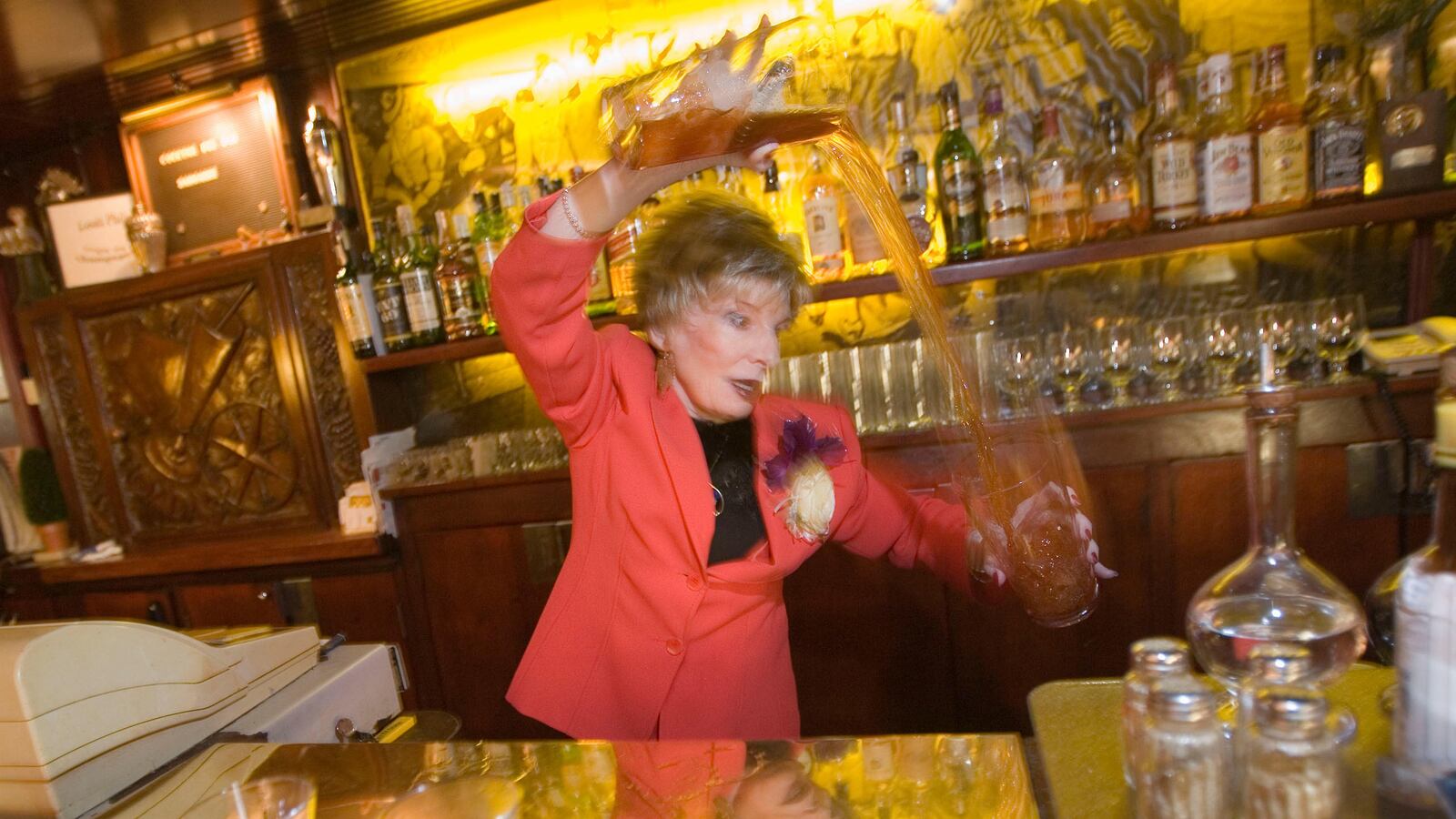In 1939, Spanish nationalists, with the help of Nazi Germany and fascist Italy, defeated their democratic-socialist enemies, thus ending the Spanish Civil War after three years of slaughter. Spain would remain under the fascist rule of General Francisco Franco until his death in 1975.
Freed from that numbing horribleness, over the last 40 years the country has developed a thriving, modern bar and restaurant scene, and there’s no place better to appreciate that than Barcelona. Leaving the restaurants for a more qualified observer, I can affirm that the city has a number of excellent modern cocktail bars, including such bright lights as Paradiso, Giacomo Gianotti’s cutting-edge speakeasy (Carrer de Rera Palau 4, behind the pastrami store), and the lovely Solange (Carrer d’Aribau 143). But I don’t want to talk about modern bars. Instead, I want to talk about the old ones. The ones that were around during Franco’s reign and the years of reconstruction that came in his wake, and are still, amazingly, here today. Not only are they great bars, but, after an evening spent visiting perhaps (OK, definitely) too many of them, I think they also have a message for us.
You can begin to see the outline of that message at the legendary Bar Boadas (Carrer dels Tallers 1), just off La Rambla—the Barcelona equivalent of Broadway—in the Raval neighborhood. In 1926, Miguel Boadas, born in Cuba of Catalan parents, was working at Havana’s legendary Floridita when he took a trip to Barcelona. There, he met a local girl and decided to stay. In 1933, he opened this bar. Now his daughter María Dolores, retired after many years behind the bar herself, owns it. Sure, the worn, dark, paneled room is odd-shaped and small and the bar lacks running water, but, with 80 years worth of memorabilia looking down from the walls, the tuxedoed bartenders make their drinks the same way the bar’s founder learned to do it at the Floridita. The cocktails are thrown in long arcs between beakers or by covering the glasses they’re going to be served in with mixing tins and shaking them right in the glass. (Both techniques are American ones of the 1800s that went to Cuba with the Yankees after the Spanish-American war and are preserved here.) The drinks are small and the bartenders—all who have been there for decades—don’t rush you through them. It’s hard to get drunk and easy to have a quiet conversation—the bar is bustling, but it isn’t rowdy and it isn’t loud. Try a Boadas Cocktail, equal parts Dubonnet, curaçao and white rum, invented by Boadas himself for the bar’s opening more than ninety years ago.
Walk down a narrow, crooked street around the corner from Boadas and, if you keep your eyes peeled, you’ll find one of its offshoots tucked away in a 12th-century building. The tiny Caribbean Club (Carrer de les Sitges 5), opened in the fateful year of 1975, is now owned by one of the city’s best bartenders, Juan José “Juanjo” González Rubiera, who holds forth pleasantly and knowledgeably from behind the tiny bar. By “tiny,” I mean tiny: The bar only has about 15 seats. The décor is nautical, with brass portholes and such everywhere—or at least everywhere that isn’t occupied by bottles of rum. The drinks, with a strong Cuban bias, are impeccable, the crowd, if you can call it that, friendly and sophisticated. The whole effect is like having drinks in your slightly eccentric friend’s home bar. It is very painful to leave.
A mile from Boadas in the elegant, broad-avenued Eixample neighborhood is another cluster of old bars. Indeed, Ideal Cocktail Bar (Carrer d’Aribau 89) is even older than Boadas, dating back to 1931, although it has had undertaken a couple of renovations since. Ideal is another intimate, even clubby space, with a horsy English décor from the 1950s, a lot of Scotch whisky and well-executed, simple cocktails. If you’re lucky, José Maria Gotardo, the bar’s genial, skilled owner and grandson of its founder, will make your drink or recommend a whisky to sip.
Three blocks up Carrer d’Aribau at 162-166 is the elegant, but not bland or stuffy, Dry Martini, a perennial contender for best bar in the world. Founded in 1979, for a number of years the only drink it served was its namesake, always made with equal parts gin and dry vermouth and garnished with a dash of orange bitters, an olive and a spritz of lemon oil and thrown in the Boadas style. Indeed, when you order one now it’s always made by the senior bartender on duty and when he’s done he uses a clicker to add it to a running tally of the number of Martinis the bar has made since opening. I can assure you that number is very high, although I can’t say how high (I was more interested in drinking Martinis and talking to new friends than taking notes). Dry Martini, which now makes plenty of other drinks as well (all impeccably) is bigger and more formal than the other bars, but there are plenty of wood-paneled alcoves where you and your friends can make the world go away. (And if you’re at Dry Martini and want one more drink, know that it’s kitty-corner from Solange, where the drinks are no joke.)
These bars are all different; they each have their specialties and their peculiar atmospherics. But they also have a few things in common. One is intimacy: When the government is a malignant presence, you want to know whom you’re drinking with. Regulars are good, the more regular the better. You also want to know your bartenders. It’s notable that all these bars are closely held and have bartenders of long standing (the ones at Boadas have mostly been there since the 1970s; at Dry Martini almost as long). With the exception of Dry Martini, they’re not flashy (and even there, the flash is tempered). Discretion allows you to hide in plain sight.
Do I think we’ll need these kinds of survival strategies? No, probably not. But the fact that I can’t be sure is worrying, to say the least. But these bars are also heartening: they show the endurance of community and the beauty of it, and the stubborn power of hospitality. To see something beautiful that has survived autocracy at its worst is heartening. During Prohibition, the last time America’s nativist minority attempted to dictate to its pragmatic majority, Americans went to Paris to drink. This time around, if you’re looking to escape the idiocy, go to Barcelona.






